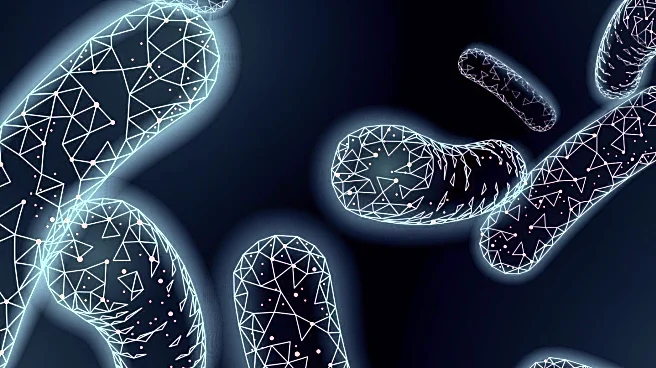What's Happening?
A recent study has identified a compound named KL1 that significantly enhances the efficacy of antibiotics against intracellular bacterial persisters, particularly Staphylococcus aureus. The research, conducted on various methicillin-resistant and methicillin-sensitive clinical isolates, demonstrated that KL1 resuscitates intracellular S. aureus, thereby improving antibiotic effectiveness in both mouse and human macrophages, as well as human primary neutrophils. Importantly, KL1 does not promote bacterial outgrowth or exhibit cytotoxicity, making it a promising adjuvant in treating infections. The study also noted differential expression of host genes involved in reactive oxygen and nitrogen species regulation, which may contribute to the compound's effectiveness.
Why It's Important?
The discovery of KL1 is significant as it addresses the challenge of antibiotic tolerance in intracellular environments, which often serve as physical barriers against treatment. With limited antibiotic options available for intracellular infections, KL1 offers a potential solution to eradicate bacterial persisters, which are a major concern in treating chronic infections. This advancement could lead to improved treatment protocols and outcomes for patients suffering from persistent bacterial infections, thereby impacting public health positively.
What's Next?
Further research and clinical trials are likely needed to fully understand the mechanisms of KL1 and its potential applications in human medicine. The study suggests that KL1 could be integrated into existing treatment regimens to enhance antibiotic efficacy, particularly in cases of resistant bacterial strains. Stakeholders in the pharmaceutical industry and healthcare providers may explore the development of KL1-based therapies, potentially leading to new drug formulations and treatment strategies.
Beyond the Headlines
The study highlights the importance of host-directed therapies in combating antibiotic resistance, a growing concern in global health. By targeting host pathways, KL1 represents a shift from traditional antibiotic development, focusing on enhancing the host's ability to fight infections. This approach may pave the way for novel therapeutic strategies that leverage host biology to overcome microbial resistance.









